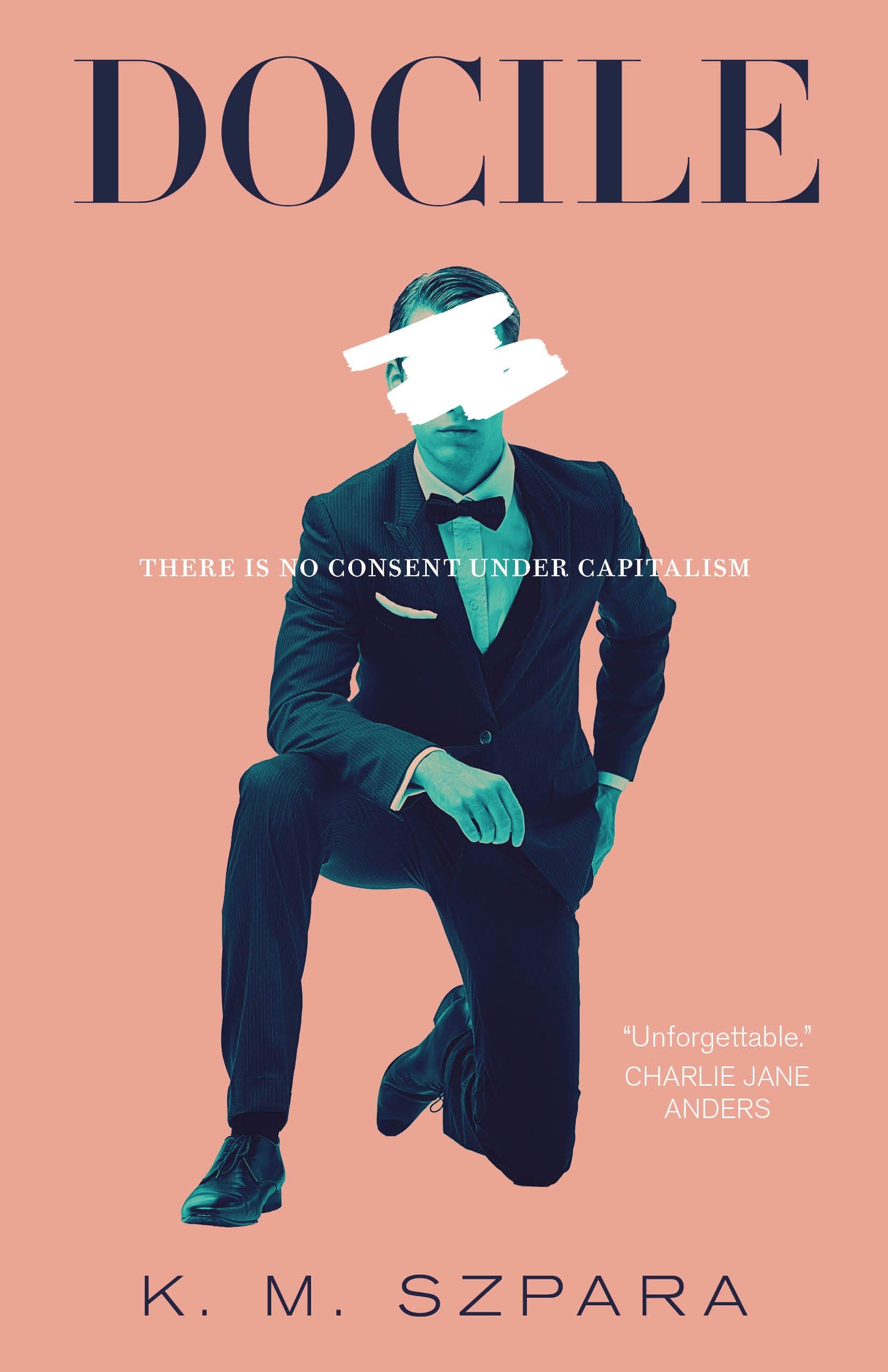 Desperate to save his family from crushing financial burdens, Elisha sells himself into debt slavery. In the near-future dystopia of K.M. Szpara’s debut novel, this means registering as a Docile. His contract will be purchased by anyone rich enough to pay the fee; these buyers also get to stipulate how long Elisha’s contract will last. Every year, thousands of people make the same decision Elisha does, most of them choosing to alleviate the trauma of their experiences by accepting Dociline, a drug which makes them obedient, compliant, and forgetful – they won’t remember any of the things they’re forced to do while on the drug.
Desperate to save his family from crushing financial burdens, Elisha sells himself into debt slavery. In the near-future dystopia of K.M. Szpara’s debut novel, this means registering as a Docile. His contract will be purchased by anyone rich enough to pay the fee; these buyers also get to stipulate how long Elisha’s contract will last. Every year, thousands of people make the same decision Elisha does, most of them choosing to alleviate the trauma of their experiences by accepting Dociline, a drug which makes them obedient, compliant, and forgetful – they won’t remember any of the things they’re forced to do while on the drug.
But Elisha’s mom was once on Dociline and never recovered from the drug, despite the fact that it is not supposed to have any side effects. Even though he’s sold himself as a Docile, he’s determined never to go on Dociline. Things get complicated when his contract is bought by Alex: young, handsome, cultured, and heir to the Dociline pharmaceutical empire. Alex bought Elisha to prove to his family that he’s capable of running the company – a task made infinitely harder by Elisha’s refusal of the drug.
The promotional tagline for this book is “There is no consent under capitalism”; I was sold as soon as I heard that, and I didn’t look up any more information about Docile before seeking out a copy to review. This means that I didn’t realize the novel I was picking up was explicit m/m BDSM. There is nothing wrong with explicit m/m BDSM! But generally, it’s probably better if readers know that going into a novel, so: now you know.
Several early readers of Docile have compared the book to Fifty Shades of Grey, a comparison I can’t comment on since I haven’t read E.L. James’s massively successful series. But I would add to those comments a strong feeling of the Capitol from The Hunger Games; lots of elements of this book definitely feel like what those people would have been getting up to if Suzanne Collins hadn’t been writing in the YA genre.
Docile is a fast-paced read, and Szpara’s smooth prose will draw in many readers looking to spice up their repertoire of dystopian romance. I appreciated the author’s efforts to model healthy boundaries of consent, and the subplot involving Empower Maryland (an organization seeking to end debt slavery and the use of Dociline) allows some room to explore the complex issues raised by the novel’s premise.
Ultimately, however, I felt that Docile didn’t deliver on the tagline to which I was so drawn. My main problem with the novel is also the conceit the book is built around: the romance/relationship between Elisha and Alex. Even though a major part of the plot is Alex recognizing that the feelings Elisha has for him can’t be real because he’s Alex’s slave, unable to make his own decisions, it still felt like we, as readers, were meant to root for the relationship.
I can never do that, because Alex seems like a truly despicable person. He doesn’t have a moral problem with Dociline (or with raping Elisha) until his feelings start to develop – what does it take for one rich man to realize how much damage he’s doing in the world? I do think Szpara makes a valiant attempt to deal with the nuances of the situation, but in the end, I didn’t find the characterization complex enough for me to be on board with the novel’s fixation on the love between Elisha and Alex. It doesn’t live up to the revolutionary promise of its tagline, which probably would have had a much more grisly end for the pharmaceutical wonder boy.
A copy of this book was provided by the publisher, Tor.com, for review.
